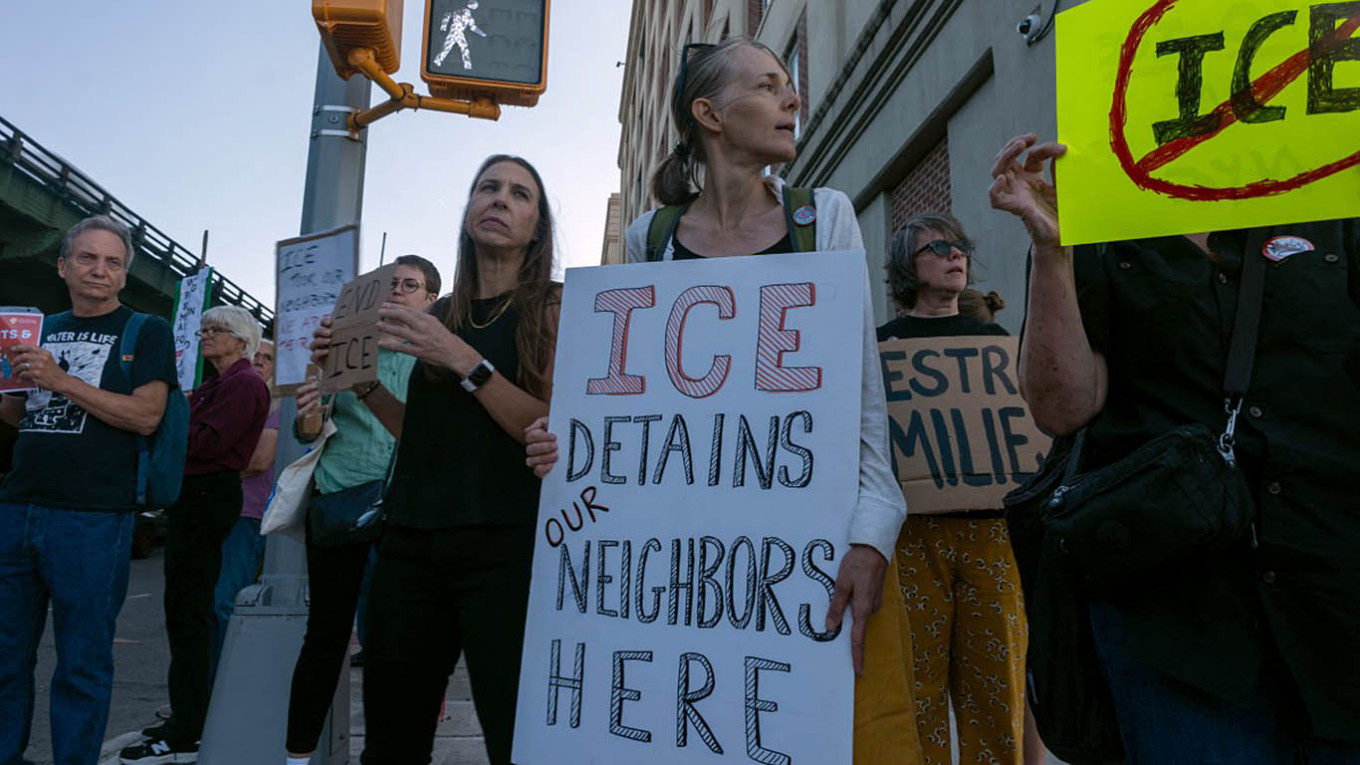Alexander Bolokhoev, a 41-year-old from the Buryatia region of Russia, was apprehended by U.S. Immigration and Customs Enforcement (ICE) agents on September 23 in Oklahoma while making a routine delivery in his box truck.
“He wasn’t even permitted to take his phone, wallet, or any personal items out of the vehicle… It was left there unlocked,” recounted Bolokhoev’s friend, Marina Khankhalaeva, who received an unexpected Instagram message from him about his detention.
Bolokhoev, who identifies as an ethnic Buryat, stated that he moved to the U.S. seeking asylum from the racial discrimination endured by people from his Mongolic ethnic group, even though they are Russian citizens born in their ancestral regions.
However, as the U.S. government implements an extensive crackdown on immigration, he has found himself among many Indigenous Russians detained and at risk of deportation—a process that echoes the discrimination they fled.
In recent years, numerous members of Russia’s diverse Indigenous communities and ethnic minorities have sought refuge in the U.S. to escape the systemic racial abuse their families have faced for generations.
According to estimates from The Moscow Times based on interviews with families and attorneys, dozens are now facing deportation. They represent a significant yet often overlooked portion of Russian asylum seekers affected by President Donald Trump’s immigration policies.
ICE, an agency under the U.S. Department of Homeland Security (DHS), declined to comment on the matter when approached by The Moscow Times.
Christopher Setz-Kelly, an immigration attorney involved with several Russian asylum cases, highlighted that most of his clients are Indigenous individuals from regions such as Tatarstan and Chechnya.
“I believe much of this stems from the Russian government’s targeting of these ethnic minorities for recruitment into the war,” Setz-Kelly told The Moscow Times. “Some hold deep-seated political beliefs that have long been in conflict with the central government, predating the war.”
He noted that many asylum cases involve multiple aspects linked to ethnic identity.
Buryatia consistently ranks among the regions in Russia with the poorest living conditions, prompting many residents to seek education and job prospects elsewhere in the country, where they risk experiencing racial profiling or xenophobic violence.
Some choose to take the step of leaving Russia altogether.
Bolokhoev was studying for his bachelor’s degree in informatics in Novosibirsk when he was detained by Russian police outside his dorm for not carrying an ID, after which he was taken to the police station and held overnight, as his friend Khankhalaeva recounted.
“They put a drunken Russian man in the same cell as him. He started a fight with Alexander and nearly killed him. The police just stood there, watching; they found it entertaining,” said Khankhalaeva, noting that the traumatic event left a lasting impact on her friend, who still recounts it vividly.
Bolokhoev crossed the U.S.-Mexico border and sought asylum in 2022. Now, three years later, his dreams in America are precariously hanging in the balance.
“It’s easy for someone unfamiliar with the U.S. to arrive and believe it’s vastly better here, assuming that racism doesn’t exist. But that perspective can quickly change when they begin to experience it, particularly on a systemic level,” remarked Elena Emelchin, an immigrant rights advocate at Asian Americans United (AAU) in Philadelphia.
“It’s not anyone’s fault, except that of the U.S. government and its propaganda,” emphasized Emelchin, who is also affiliated with Sarin Gal, a social justice group for the Indigenous Oirat-Kalmyk people of Kalmykia.
Emelchin noted that AAU has seen a significant rise in ICE detentions since early September, documenting 25 cases in their community, with 15 occurring in just the last month.
Around 25% of the cases addressed by AAU share similarities with Bolokhoev’s situation, as he was detained while working. The remaining 75% are individuals held during routine appointments with ICE or other federal agencies, according to Emelchin.
“The U.S. government is effectively coercing people into potential detention or compelling them to violate regulations, labeling them as criminals to justify their expulsion. It’s a lose-lose situation, creating immense stress for many families,” she clarified.
Bolokhoev’s experience mirrors those shared by other detained Russian asylum seekers interviewed by The Moscow Times in recent weeks.
Many reported facing undue scrutiny merely for being Russian and encountering specific obstacles such as the lack of access to Russian-speaking legal assistance.
One individual identifying as ethnic Ukrainian recounted feeling discriminated against by immigration officials due to his Russian passport.
“I saw others being released daily,” said the man, who spoke to The Moscow Times from a detention facility in Georgia and requested anonymity. “We were left wondering, ‘Why are we here?’”
The response he received was: “Because you’re Russian.”
His asylum request has recently been denied, and he faces imminent deportation if his appeal is unsuccessful. He claims he would likely face imprisonment upon returning to Russia for charges related to “discrediting” the military and spreading “false information.”
Another man, a member of a large Indigenous group who also chose to remain unnamed, described the traumatic experience of being detained during a routine appointment with immigration officials, a process that has become increasingly common.
After leaving Russia in the wake of the Ukraine invasion, he and his wife sought to relocate to the U.S. to provide better opportunities for their children.
“I wasn’t drafted, but the thought of my country attacking civilians was unbearable. These were our closest neighbors,” he explained. “I didn’t want my children to grow up surrounded by such propaganda,” referring to the prevalent pro-war sentiments in Russia.
They arrived in the U.S. via Mexico in late 2023 and, after securing temporary living arrangements, finally felt they had found a stable home: a city with a vibrant Russian-speaking community and ample job prospects.
The man enrolled in classes at a local university, and last year he and his wife welcomed a child.
However, during what they believed would be a straightforward document check this fall—after having missed a prior appointment due to illness—ICE officers detained him and instructed his wife to return for an appointment scheduled for March 2026.
“When we were detained, all our personal belongings were taken. I don’t understand why, but they handcuffed us and shackled our feet,” he recounted. “I assured my wife that everything would be okay. [Then] they placed us in cells, and when the workday ended, they transferred us to a federal prison.”
The man and his family preferred to remain anonymous as they contemplate “self-deportation,” a tactic promoted by the Trump administration to supposedly diminish the number of undocumented immigrants.
The Moscow Times confirmed his account with his family and lawyer.
“When I came to the U.S., I anticipated a more welcoming and democratic approach toward migrants, with more rights and freedoms available,” he said.
Now, he observes parallels between his circumstances and those of migrants within Russia facing increasing anti-immigrant policies and discrimination.
“In the U.S., I would say it’s distinctly different, but in some respects, the treatment of migrants is reminiscent of Russia,” he noted. “Now it’s similar in Russia: migrants are detained and scrutinized, and it feels almost the same here.”
While DHS has reportedly allocated hundreds of millions of dollars towards promoting the self-deportation agenda, Emelchin mentioned that there have been “very few” such instances within the Indigenous communities from Russia that she represents.
For many of these individuals, returning to Russia feels akin to facing a death sentence.
“If he is deported back to Russia, the FSB will be waiting for him on the tarmac,” warned Buryat activist Khankhalaeva, who is advocating for Bolokhoev’s release after his detention in Oklahoma.
Concerned about the disproportionate mobilization of fellow Buryats for Russia’s military efforts in Ukraine, Bolokhoev co-founded the exiled Buryat national liberation movement, Tusgaar Buryad-Mongolia, with Khankhalaeva in 2022.
Last year, Tusgaar Buryad-Mongolia was labeled a “terrorist” organization by Russia, along with over 170 other Indigenous rights groups, which means its founders could face up to 20 years in prison in Russia.
Khankhalaeva, convinced that Bolokhoev will face severe punishment in a Russian prison, expressed fear that he may be pressured to disclose the identities of anonymous members of her team, placing their families in jeopardy.
“He must not be deported,” she insisted.

